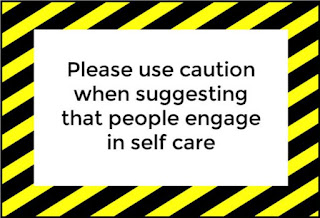The Problem with Suggesting Self-Care
This is a friendly reminder that "self care" and "wellness" are both fine things to aim for--but that the terms can also be deployed in harmful ways. They can be used to blame victims, and to distract us from demanding social change.
When someone talks about how stressed or depressed or exhausted they are, it's common today for others to tell them to practice self-care. And it's true that we all need to learn what our boundaries are, and how to say no to requests that cross them. We need to nourish our bodies, take breaks, engage in activities we enjoy, and so on.
But if someone is in distress because they are facing harassment, or their kid has to stay home for the week due to Covid in the classroom but their boss won't let them take off work, or they can't pay their medical bills, then telling them they should take B vitamins or have a relaxing pedicure or download an affirmations app is just wrong. It implies that the problem isn't inequality and injustice, but their poor self-care skills.
Yes, people dealing with unfair and cruel life circumstances can benefit from eating well or relaxing at a spa. But when people really don't have the time or money to do those things, it adds insult to injury to tell them their suffering is their fault because they are failing to engage in the approved wellness activities. And worse, it ignores our collective responsibility to change the unfair social circumstances that are harming them.
So the next time you hear someone say that they are burnt out or constantly anxious or having trouble getting up and going to work, before you suggest your favorite self-care activity, be sure to ask them why. And if the problem is that they are being bullied or discriminated against or unaccommodated, offer to do something to change that. Otherwise, at best you are treating the symptom and not the disease.




Comments
Post a Comment